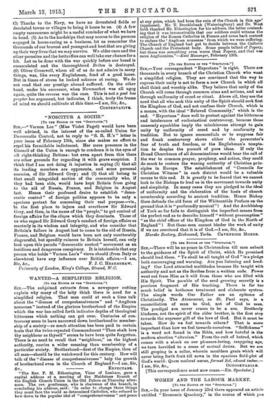[TO THE EDITOR OV Tea SPECTLEOH1
Snt,—Your correspondent "Erpectans " is right. There are thousands in every branch of the Christian Church who want a simplified religion. They are convinced that the way to express their unity is not to form a new Church in which all shall think and worship alike. They believe that unity of the Church will come through common aims and actions, and not through uniformity of creed or ritual Above all, they see the need that all who seek this unity of the Spirit should seek first the Kingdom of God, and not confuse their Church, which is a means, with the ideal "Beloved Community," which is the end. "Expectant;" does well to protest against the bitterness and intolerance of ecclesiastical controversy, because these unseemly squabbles imply the mischievous attempt to gain unity by uniformity of creed and by conformity to tradition. But to ignore unessentials or to suppress fair and frank controversy shows either the persecutor's fear of truth and freedom, or the Englishman's tempta- tion to despise the pursuit of pure ideas. If only the Broad Churchmen of all denominations would hear the call of the war to common prayer, prophesy, and action, they could do much to restore the waning authority of Christian prin. ciples in Europe. The establishment of " Councils for Christian Witness" in each district would be a valuable means to this end. It is greatly to be feared that we cannot look to the Bishops to lead us in the movement towards unity and simplicity. In many cases they are pledged to the ideal of uniformity and the elaboration of the basis of church membership according to ancient tradition. Hence Bishop Gore defends the old form of the Whitsturtide Preface on the ground that it is "profoundly musical" I And the Archbishop of York so far fails to distinguish the imperfect means from the perfect end as to describe himself "without presumption" "as the chief officer of the Kingdom of God in the North of England" I But these men cannot hinder the work of unity if we are convinced that it is of God.—I am, Sir, &c., Marsha Rectory, Richmond, Yorks, 0AvENDIeu Mount.


































 Previous page
Previous page